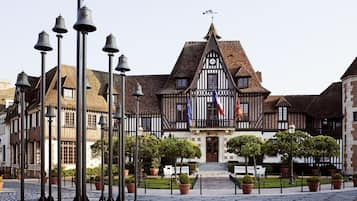Calvados, in Normandy, is the home of Deauville and a region that knows how to make the most of its land. This region's landscape is shaped by its orchards. The fruit cultivated so magnificently here is used in a number of different ways in desserts and drinks or in a melange of sweet and savoury flavours.
Cream and butter – components of many of the local recipes – are provided by local dairy farms, as are the cheeses that help give the region its local identity. You'll also enjoy tasting the exceptional meats and poultry offered by local farms. However, Deauville and Calvados also form part of the Côte Fleurie coast, and, of course, coastlines mean exceptional fishing opportunities. It's an outstanding example of diversity, ready for you to enjoy. Be sure not to miss these 10 delicacies to try in Deauville.
- 1
Calvados and cider
Cheers.

- Yemek
Calvados and cider are inseparable from the gastronomic landscape of the region that, incidentally, gave its name to the latter. Normandy is an area particularly conducive to apple growing, where you can find more than 400 apple varieties, all with names each more poetic than the last: Rossignol (lit. nightingale), Rouge-Mulot (lit. red field mouse) or Change-Souvent (lit. often changes).
With its amber colour, jubilant bubbles and fluffy head of foam, the region's cider truly showcases the aromas of the fruit, processed by age-old techniques. It's meant to be drunk cold, with a meal. Calvados, for its part, comes from the distillation of cider (or pear cider), which is then stored in oak casks for between 3 and 20 years. It can be drunk as an aperitif, as an after-dinner liqueur or even in coffee.
- 2
Normandy cheeses: Camembert, Pont-l’Évêque et Livarot
A winning trio

- Yemek
Normandy cheeses like Camembert, Pont-l’Évêque and Livarot are among the region's most popular delicacies. At the head of the pack, we have Camembert, a cheese made from the unpasteurised milk of Normande cows, characterised by a soft middle, bloomy rind and a strong, fruity taste. Of course, it can be enjoyed alongside a good cider, but it's also used in a number of recipes, such as puff pastry dishes or croquettes.
Livarot is known for its orangey rind and very distinct milky taste with hints of fruit and hay and is to be eaten with bread at the end of the meal. And as for Pont l'Évêque, this is a more subtle, firmer cheese that's well-loved by gourmets.
- 3
Scallops
The height of sophistication

- Yemek
In Normandy, scallops, the most noble of seafood take on an even more decadent dimension with plentiful meat and well-rounded coral. Harvested using fishing dredges, scallops from the waters of Normandy are stamped with a red label, guaranteeing their freshness and quality. These can be prepared in a number of different ways, which you can try in some of Deauville's finest restaurants.
Pan-fried or roasted with a little salted butter, marinated in cider vinegar, sliced, with cream or even a bechamel sauce, these specialities won't disappoint, and will undoubtedly make you feel like you're at a party. Don't miss out on this true delight during your holiday.
- 4
Sole Normande
Sophistication personified

- Yemek
Sole Normande is, as expected, a real party dish and has established itself as a classic of French cuisine. You'll understand why after you've tasted it. The dish was actually invented in Paris before being adopted by the region from which it takes its name.
It combines fillets of the white fish with mussels, crayfish, oysters, gudgeon fritters and mushrooms. It's then topped with a sauce made from shallots, white wine and creme fraiche with, as a finishing touch, the juice of the mussels and some mushrooms. This dish is as complex as it is delicious and goes very well with rice and a glass of dry white wine.
- 5
Poulet Vallée d’Auge
Local produce and creativity

- Yemek
Poulet Vallée d'Auge (Auge Valley Chicken), another of the region's top culinary dishes, is made from local ingredients including farm-certified poultry, apples, mushrooms, creme fraiche and Calvados. The pieces of chicken are first sautéed in butter, then flambéed in the alcohol before being simmered over a low heat with the other ingredients.
The caramelised apples that accompany this heavy dish give it a festive, melt-in-your-mouth touch. Keep a little bread to mop up the sauce, the flavourful cream is well worth it. Rice or tagliatelle would go very well with this dish, all accompanied by some farmhouse cider.
fotoğraf: Ludovic Péron (CC BY-SA 3.0) değiştirildi
- 6
Pain Brié
King of the bakeries

- Yemek
Pain brié, with its perfectly golden crust and 3 parallel cuts on top, can be found on all the shelves of the region's bakeries. It has a particularly dense and tight crumb as well as a relatively thick crust, making it quite a heavy bread that goes well with platters of shellfish or seafood. Its name comes from the brie, a tool used to get rid of the air during the kneading phase specific to this recipe. Its low moisture content allows it to be kept for a long time (in fact, fishermen would take a loaf with them during their expeditions at sea), whereas its butter content gives the bread its soft texture that has tempted more than a few.
fotoğraf: Frédéric BISSON (CC BY 2.0) değiştirildi
- 7
Pain brié
A sweet delicacy

- Yemek
Pain brié, with its perfectly golden crust and 3 parallel cuts on top, can be found on all the shelves of the region's bakeries. It has a particularly dense and tight crumb as well as a relatively thick crust, making it quite a heavy bread that goes well with platters of shellfish or seafood.
Its name comes from the brie, a tool used to get rid of the air during the kneading phase specific to this recipe. Its low moisture content allows it to be kept for a long time (in fact, fishermen would take a loaf with them during their expeditions at sea), whereas its butter content gives the bread its soft texture that has tempted more than a few.
- 8
French Apple Tart
The taste of tradition

- Yemek
Confiture de lait (milk jam), paired with crepes, brioche or ordinary bread, combines the taste of milk with the flavours of caramel: a real treat to be enjoyed at anytime of the day. It's made by simmering semi-skimmed milk with a generous helping of sugar until it has thickened and taken on a golden colour.
This smooth, creamy mixture is usually made by hand and embellished with pretty labels: an ideal souvenir to give to your food-loving friends (or to be kept for yourself because, once you've tasted it, it is hard to resist).
- 9
French apple tart
Good food, Normandy style

- Yemek
The French apple tart is Normandy's own version of apple tart – and what a version it is. The tart manages to combine a real cocktail of ingredients of the land: as well as the delicious, crunchy, old variety of fruits, such as Calville or King of the Pippins, it contains cream, butter and even Calvados.
The pastry is usually shortcrust, but can also be puff, and is coated with a layer of jam, then garnished with either caramelised or uncooked apple quarters. Some flambé the tart with Calvados after having sprinkled it with sugar, and eat it with a generous helping of creme fraiche. It's best eaten straight from the oven for a wonderful balance of textures and flavours.
- 10
Fondue Normande
A classic with a local twist
- Yemek
Teurgoule, a regional take on rice pudding, must not be missed. Below a lightly bruléed crust is a creamy mixture that gets its soft texture from a long baking time at a low temperature, cooked in an earthenware pot specially designed for this well-loved dessert. Teurgoule can be flavoured with cinnamon or vanilla and enjoyed with a little brioche and cider.
It was eaten in former times on Sundays or celebration days, when people would eat it as quickly as possible while it was still hot (hence the name, which means 'to agonise the mouth'). If you'd like to buy some, head off to the bakery, deli or market, although it can sometimes be found in certain supermarkets and traditional restaurants.


















